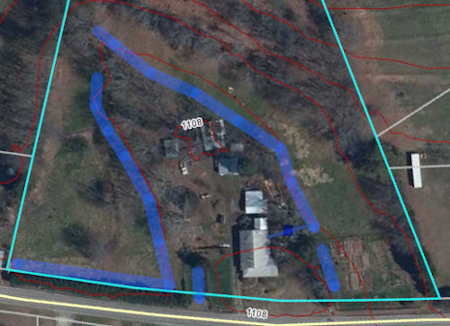We took time our first years here for observation, analysis, and planning. At that time, we had three areas for self-reliance that we wanted develop: food, energy, and water. Water conservation and stewardship included rainwater collection and greywater usage. For rainwater, we started with collection tanks. For greywater, we added a couple of ideas to our master plan, where we identified two potential areas to use it.
 |
| Greywater ideas from our 2012 Master Plan. |
Greywater is a topic we researched carefully because there are precautions that must be taken. We bought Art Ludwig's Create an Oasis With Greywater (my book review here), and I researched dos and don'ts for household soaps, detergents, and cleaners (that blog post here.) We experimented some too, and used it to water tall plants like okra and corn. From those experiments, we felt that some sort of filtration would work best for us.
When the summer rains became less frequent this month we got to talking about this. We got out our master plan (above) and discussed how we could construct a greywater wetland. Originally, the wetland idea was for a constructed filtration bed with rock, gravel, sand, and soil, plus water filtering plants. From there, it would drain out to the pasture. This would have required a lot of work, but we don't have the time or resources for an extensive project right now. Another commonly used idea for greywater, is a mulch pit. We got to wondering if we couldn't mulch pit that drained into our pasture swale. It would be a first step experiment, just to see how it would do.
 |
| This is how it fits into our swale plan. The filtration bed is the little blue square between the house and pasture on the right. |
The greywater drainage pipe was already in place. Dan installed it in 2016, complete with a bypass valve to direct the greywater either to the garden or to the septic tank. We haven't used it in several years, but this summer seemed the time to put it to use again. We brainstormed. For the mulch bed, we had a cracked water tote with five good sides. Dan cut it down and that made a start.
 |
| Filled with rain water! |
 |
| Completed project. You can see the greywater pipe coming from the kitchen, and the mostly buried exit pipe going to the pasture. |
 |
| View from another angle. The path leads to the garden. |
Periodically, this will need to be cleaned out and fresh chips added. The old chips will get mixed into a new compost pile, and the bed refilled with fresh chips, or even better, a combination of wood chips and biochar.

7 comments:
One of the things I like about small farming is the problem solving - running into an issue and fixing/repairing/solving, preferably with items we already have on hand. You and Dan are masters at this! I'm inspired the depth of research you do and that you strive for long term fixes that work for the good of you, the land and your animals. So enjoyable and educational to read!
Kate, thank you for your kind words! I have to confess that learning problem solving and working on answers was something that took years to develop. I don't think these are skills that are taught much. Mostly, we're trained to look to the experts and buy the solutions.
I've thought about this before but unfortunately codes in our area used to prohibit us from doing it. While we are still prohibited, it is now allowed if one meets a list of qualifications, the hardest one being you have to discharge only a tiny amount of water per month. As global warming and water shortages become more of an issue, this whole area needs to be rethought out.
Ed, I absolutely agree with you that greywater restrictions need to be re-thought. Now more than ever. If they're worried about people not doing it properly, then they need to set up free workshops and offer to send volunteers out to double check the system. Art Ludwig's book and website deal with this extensively, with lots of good advice on how to get local laws changed.
We don't seem to have any restrictions for grey water that I know of. Maybe for those on town water. We're still on a well with a septic system though. We've not really thought too much about that issue because we've so much else to do first. We don't see too many swales, but we do have ditches, along roads and along some field edges for water catchment and drain-off, which can be a huge issue in the spring when the snow melts. Generally though rural grey water just filters off sump pumps and the septic systems.
Nina, I very much related to "so much else to do first"!
I'm guessing it may depend on total annual rainfall too. Our summers are so hot and dry that water is constantly on our minds. It's difficult to keep everything alive, so that keeps water high on our to-do list.
Thank you for sharing Leigh. I will admit that this is not a something I know a great deal about - but to echo Ed, something that I need to learn more on, and something that authorities will need to rethink.
Post a Comment